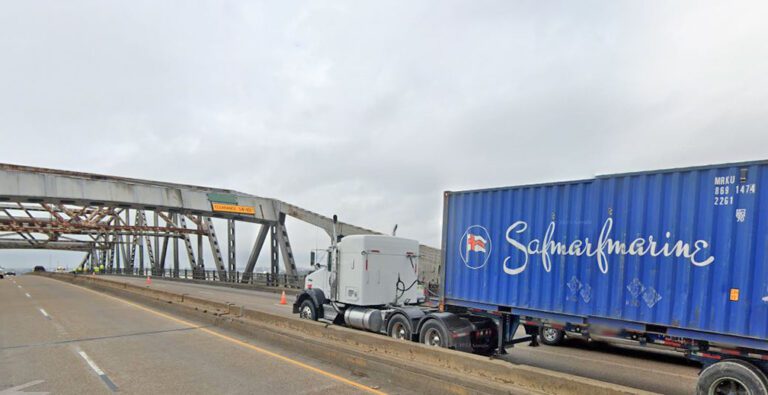WASHINGTON — The federal government’s multi-billion infrastructure improvement bill, formally known as the Bipartisan Infrastructure Law (BIL), has left many wondering just what’s in it for them since President Biden made it official with his signature in late 2021.
To help answer those questions, the White House recently released new state-by-state fact sheets outlining the BIL’s progress. The Biden administration announced almost $200 billion in funding and more than 20,000 projects or awards.
These awards and projects touch more than 4,500 communities, according to the White House.
Following are some of the dollar amounts announced for projects affecting roads, bridges, roadway safety and major construction in some of America’s largest and most traveled states.
FLORIDA
To date, $8.1 billion in BIL funding has been announced and is headed to Florida, with more than 175 specific projects identified. Since the BIL passed, Florida will receive approximately $6.3 billion for transportation to invest in roads, bridges, public transit, ports and airports.
In Florida, there are 408 bridges and more than 3,564 miles of highway in poor condition. Based on formula funding alone, Florida is expected to receive approximately $13.3 billion over five years in federal funding for highways and bridges.
To date, $5.2 billion has been announced in Florida for roads, bridges, roadway safety and major projects.
This includes:
- $5.1 billion in highway formula funding and $105.3 million in dedicated formula funding for bridges in 2022-23.
- $85.8 million through the RAISE program, $27 million through the INFRA program in 2022-23.
A $15 million grant from the U.S. Department of Transportation (USDOT) will help build a new truck parking facility along Interstate 4 in west central Florida with about 120 spaces, EV charging stations and pedestrian infrastructure to access nearby amenities, according to the White House.
“This corridor between Tampa and Orlando carries an average of 18,000 trucks daily, but currently lacks sufficient parking,” the fact sheets note. “The facility will be connected to Florida’s Department of Transportation Truck Parking Availability System in order to help drivers identify available parking locations more quickly. By providing reliable parking capacity, the project improves safety for tired drivers and makes supply chain movement more efficient.”
CALIFORNIA
To date, $18.1 billion in BIL funding has been announced and is headed to California, with more than 570 specific projects identified for funding, according to the White House fact sheets.
California will receive approximately $14.5 billion for transportation to invest in roads, bridges, public transit, ports and airports.
In California, there are 1,536 bridges and more than 14,220 miles of highway in poor condition. Based on formula funding alone, California is expected to receive approximately $28.2 billion over five years in federal funding for highways and bridges.
To date, $11 billion has been announced in California for roads, bridges, roadway safety and major projects.
This includes:
- $10.2 billion in highway formula funding and $1.1 billion in dedicated formula funding for bridges in 2022-23.
- $119.6 million through the RAISE program, $150 million through the INFRA program, and $25 million through the Rural Surface Transportation Grant Program in 2022-23.
California has also been allocated $138.5 million in 2022-23 to build out a network of electric vehicle (EV) chargers across the state.
Additionally, $400 million has been awarded the Golden Gate Bridge, Highway and Transportation District in California to replace, retrofit and install critical structural elements on the Golden Gate Bridge to increase resiliency against earthquakes.
“The Golden Gate Bridge is vital to an estimated 37 million vehicles crossing the bridge per year, including 555,000 freight trucks, as well as waterborne commerce through the Golden Gate Strait connected to the Port of Oakland,” the White House fact sheets note. “The improvements will ensure the structural integrity of a vital transportation link between San Francisco and Marin County. This bridge allows for the movement of people and freight along the California Coast and is a critical link for bicyclist and pedestrian traffic in the region.”
TEXAS
To date, $14 billion in BIL funding has been announced and is headed to Texas, with more than 328 specific projects identified for funding.
Texas will receive approximately $12.2 billion for transportation to invest in roads, bridges, public transit, ports and airports, according to the White House.
In Texas, there are 818 bridges and more than 19,441 miles of highway in poor condition. Based on formula funding alone, Texas is expected to receive approximately $27.5 billion over five years in federal funding for highways and bridges.
To date, $10.7 billion has been announced in Texas for roads, bridges, roadway safety and major projects.
This includes:
- $10.4 billion in highway formula funding and $230.7 million in dedicated formula funding for bridges in 2022-23.
- $101.6 million through the RAISE program and $25 million through the INFRA program in 2022-23.
Texas has also been allocated $147.2 million in 2022-23 to build out a network of EV chargers across the state.
Among the major projects being funded by these dollars is the $125 million Interstate 10 Calcasieu River Bridge Replacement Project — a joint effort by Louisiana and Texas.
“The funding will design and construct a new bridge over the Calcasieu River with three travel lanes and one auxiliary lane in each direction,” according to the White House. “This grant will generate
new 16,120 jobs for Texas. This project will ensure that the segments of I-10 expand throughout the nation.”
The White House notes that the the segment of I-10 from San Antonio connecting through Lake Charles, Louisiana, to New Orleans is one of the Top 25 Domestic Freight
Corridors for commodity tonnage in the nation.
The Louisiana Department of Transportation expects the value of truck freight moved in the region to grow from $13.5 billion in 2020 to $28.2 billion by 2050.
“The project will aim to relieve a national freight bottleneck and improve regional mobility challenges in the areas surrounding the 70-year-old Calcasieu River Bridge,” the White House fact sheets note.
NEW YORK
To date, $9.6 billion in BIL funding has been announced and is headed to New York, with more than 172 specific projects identified for funding. Since the BIL passed, New York will receive approximately $8.4 billion for transportation to invest in roads, bridges, public transit, ports and airports.
In New York, there are 1702 bridges and more than 7,292 miles of highway in poor condition.
Based on formula funding alone, New York is expected to receive approximately $13.6 billion over five years in federal funding for highways and bridges.
To date, $5.3 billion has been announced in New York for roads, bridges, roadway safety and major projects.
This includes:
- $4.5 billion in highway formula funding and $817.9 million in dedicated formula funding for bridges in 2022-23.
- $59.2 million through the RAISE program, $110 million through the INFRA program, and $959.3,000 through the Rural Surface Transportation Grant Program in 2022-23.
One of the biggest projects being funded in New York is the redevelopment of the Hunts Point Terminal Produce Market intermodal facility with expanded refrigerated warehouse space and EV charging stations for trucks and cars.
The new Produce Market will be an approximately 1 million square-foot, state-of-the-art intermodal facility with approximately 824,600 square feet of refrigerated warehouse space with solar panels or a green roof.
According to the White House fact sheets, “the project will boost the economy by improving one of the largest food distribution centers in the country. It will make the operation safer by separating vehicular, truck, rail, and pedestrian circulation and expanding truck queuing and parking areas within the facility. With the new facility, diesel-powered truck refrigeration units will no longer idle on site, resulting in emissions reductions.”
PENNSYLVANIA
To date, $8.1 billion in BIL funding has been announced and is headed to Pennsylvania, with more than 168 specific projects identified for funding. Since the BIL passed, Pennsylvania will receive approximately $6.2 billion for transportation to invest in roads, bridges, public transit, ports and airports and roughly $240 million for clean water.
In Pennsylvania, there are 3,353 bridges and more than 7,540 miles of highway in poor condition. Based on formula funding alone, Pennsylvania is expected to receive approximately $13.2 billion over five years in federal funding for highways and bridges.
To date, $5.1 billion has been announced in Pennsylvania for roads, bridges, roadway safety and major projects.
This includes:
- $4.4 billion in highway formula funding and $706.8 million in dedicated formula funding for bridges in 2022-23.
- $36.3 million through the RAISE program, $20.3 million through the INFRA program, and $69 million through the Rural Surface Transportation
Grant Program in 2022-23.
The USDOT awarded $20.3 million to the Philadelphia Regional Port Authority to construct a 100,000 square-foot warehouse with rail access, employee parking and loading docks and modernize other features. This project with increase the port’s capacity, reduce truck congestion, facilitate the movement of goods and improve air quality in nearby underserved communities.
ILLINOIS
To date, $8.2 billion in BIL funding has been announced and is headed to Illinois, with more than 165 specific projects identified for funding. Since the BIL passed, Illinois will receive approximately $6.2 billion for transportation to invest in roads, bridges, public transit, ports and airports and roughly $288 million for clean water.
In Illinois, there are 2,374 bridges and more than 6,218 miles of highway in poor condition. Based on formula funding alone, Illinois is expected to receive approximately $11.3 billion over five years in federal funding for highways and bridges.
To date, $4.4 billion has been announced in Illinois for roads, bridges, roadway safety and major projects.
This includes:
- $3.9 billion in highway formula funding and $594.5 million in dedicated formula funding for bridges in 2020-23.
- $83.5 million through the RAISE program, $70 million through the INFRA program in 2022-23.
The City of Chicago was awarded $144 million from the USDOT to rehabilitate four bridges over the Calumet River on the Southside of Chicago. The Calumet River connects Lake Michigan with the Lake Calumet Port District, which is further connected to the Illinois River providing access to the Gulf of Mexico. Each bridge lifts an average of 5,000 times per year, providing continuous access for marine traffic to and from the port and surrounding industry.
“Rehabilitating these bridges ensures that communities on either side of the river remain connected and the bridges continue to function to allow barge and ship traffic to traverse to the Illinois International Port and beyond,” the White House fact sheets note. “The project will eliminate a load restriction and truck detours. It will also add dedicated bike lanes and improved sidewalks to support community connections.”
OHIO
To date, $6.6 billion in BIL funding has been announced and is headed to Ohio, with more than 158 specific projects identified for funding. Since the BIL passed, Ohio will receive approximately $5.8 billion for transportation to invest in roads, bridges, public transit, ports and airports and roughly $241 million for clean water.
In Ohio, there are 1,377 bridges and more than 4,925 miles of highway in poor condition. Based on formula funding alone, Ohio is expected to receive approximately $9.9 billion over five years in federal funding for highways and bridges.
To date, $3.8 billion has been announced in Ohio for roads, bridges, roadway safety and major projects.
This includes:
- $5 billion in highway formula funding and $208.6 million in dedicated formula funding for bridges in 2022-23.
- $52.9 million through the RAISE program and $127.1 million through the INFRA program in 2022-23.
A total of $250 million was awarded through the Mega Grant Program for the Brent Spence Bridge connecting Kentucky and Ohio, part of a total investment of $1.6 billion from the infrastructure law to build a new companion bridge and rehabilitate an existing bridge along a major freight corridor on Interstate 75.
“The bridge is very important economic connection that carries a large amount of commuter traffic and over $400 billion in freight movement annually this project will contribute to mobility, freight movement and supply chains nationwide,” the White House fact sheets note.
GEORGIA
To date, $4.9 billion in BIL funding has been announced and is headed to Georgia, with more than 154 specific projects identified for funding. Since the BIL passed, Georgia will receive approximately $4.2 billion for transportation to invest in roads, bridges, public transit, ports and airports and roughly $159 million for clean water.
In Georgia, there are 374 bridges and more than 2,260 miles of highway in poor condition. Based on formula funding alone, Georgia is expected to receive approximately $9.2 billion over five years in federal funding for highways and bridges.
To date, $3.6 billion has been announced in Georgia for roads, bridges, roadway safety and major projects.
This includes:
- $3.5 billion in highway formula funding and $90 million in dedicated formula funding for bridges in 2022-23.
- $50 million through the RAISE program in 2022-23.
A total of $25 million will be used to complete street improvements along North Avenue in Athens. The route is a main connection between low income communities north of State Route 10 and resources in Downtown Athens, according to the White House fact sheets.
MICHIGAN
To date, $5.1 billion in BIL funding has been announced and is headed to Michigan, with more than 191 specific projects identified for funding. Since the BIL passed, Michigan will receive approximately $4.4 billion for transportation to invest in roads, bridges, public transit, ports and airports and roughly $213 million for clean water.
In Michigan, there are 1,219 bridges and more than 7,345 miles of highway in poor condition. Based on formula funding alone, Michigan is expected to receive approximately $7.9 billion over five years in federal funding for highways and bridges.
To date, $3.1 billion has been announced in Michigan for roads, bridges, roadway safety and major projects.
This includes:
- $2.8 billion in highway formula funding and $243.3 million in dedicated formula funding for bridges in 2022-23.
- $52.1 million through the RAISE program, $104.7 million through the INFRA program in 2022-23.
A total of $104 million in funding will go toward project replacing the Interstate 375 freeway in Detroit from a sunken freeway with a new lower-speed boulevard with pedestrian walkways, according to the White House fact sheets.
“Built in the 1960s, the I-375 displaced thousands of residents in the Black communities of Black Bottom and Paradise Valley,” the fact sheets note.
Among other improvements, the project will realign the ramps and freeway near I-375, install calming traffic measures, remove old bridges and stormwater runoff pump stations and construct wider sidewalks and separated buffered cycle tracks with protected and signalized pedestrian crossings.
“The project will reconnect neighborhoods, reduce costs, and improve safety,” according to the White House.
NORTH CAROLINA
To date, $4.3 billion in BIL funding has been announced and is headed to North Carolina, with more than 143 specific projects identified for funding. Since the BIL passed, North Carolina will receive approximately $3.5 billion for transportation to invest in roads, bridges, public transit, ports and airports and roughly $199 million for clean water.
In North Carolina, there are 1,460 bridges and more than 3,116 miles of highway in poor condition. Based on formula funding alone, North Carolina is expected to receive approximately $7.8 billion over five years in federal funding for highways and bridges.
To date, $3 billion has been announced in North Carolina for roads, bridges, roadway safety and major projects.
This includes:
- $2.8 billion in highway formula funding and $197.4 million in dedicated formula funding for bridges in 2022-23.
- $60.2 million through the RAISE program, $100 million through the INFRA program, and $10.4 million through the Rural Surface Transportation Grant Program in 2022 and 2023.
North Carolina has been allocated $39.4 million in 2022-23 to build out a network of EV chargers across the state.
A total of $110 million has been allocated to the North Carolina Department of Transportation to replace the Alligator River Bridge on U.S. Highway 64 with a modern high-rise fixed
span bridge along the primary east-west route in northeastern North Carolina between Interstate 95 and the Outer Banks, according to the White House fact sheets.
The Trucker News Staff produces engaging content for not only TheTrucker.com, but also The Trucker Newspaper, which has been serving the trucking industry for more than 30 years. With a focus on drivers, the Trucker News Staff aims to provide relevant, objective content pertaining to the trucking segment of the transportation industry. The Trucker News Staff is based in Little Rock, Arkansas.















this is all well and said but truckers need more cost effective parking facilities, with showers, laundry and healthier choices of foods in this places.